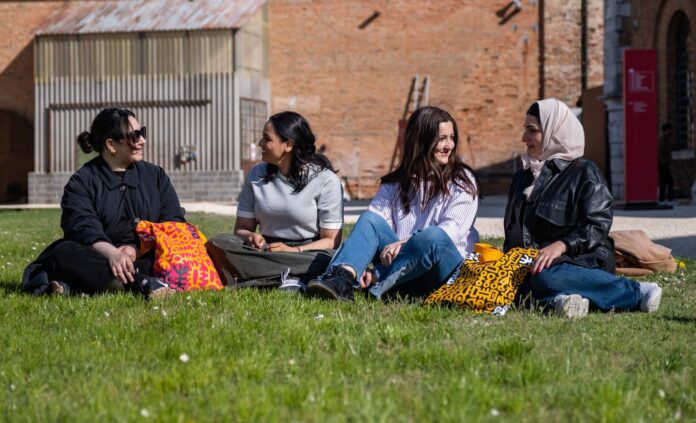DUBAI: Emirati creatives have revealed how the country’s national pavilion at the Venice Biennale has broadened their careers and changed their lives.
Multidisciplinary artist, curator and educator Sarah Al-Agroobi was one of the first to take part in the UAE National Pavilion’s internship program during La Biennale di Venezia in 2011. Today, she works full-time as a Senior Interpretation Specialist in the education department at the Department of Culture and Tourism-Abu Dhabi, and part-time as an adjunct professor at Zayed University teaching graphic design and art foundation.
The internship program was conceived to provide Emiratis and longtime UAE residents aged 21 and above with the opportunity to spend one month in Venice staffing the UAE’s art and architecture exhibitions at La Biennale di Venezia. (Supplied)
The program, said Al-Agroobi, served as a major catalyst for her career. It was conceived to provide Emiratis and longtime UAE residents aged 21 and above, who are passionate about the arts, diplomacy, and architecture, with the opportunity to spend one month in Venice staffing the UAE’s art and architecture exhibitions at La Biennale di Venezia. Al-Agroobi is one of around 200 interns who have taken part in the program and now work in prominent positions in art and culture.
What she loved about the internship, she says, was “the freedom to be curious and the flexibility and ability to explore that curiosity.”
Al-Agroobi recalls how the first time she went to La Biennale di Venezia was in 2007 when she was 16 years old. “I still remember the feeling of entering the Arsenale and believing that at some point in the future I would be working there representing the UAE,” she told Arab News. “Call it divine intervention or the power of manifestation, but it definitely was a calling of sorts.”
While she considers herself first and foremost an arts practitioner, Al-Agroobi is also the founder of The Letters Project, an online platform that aims to foreground anonymous letters that speak to the anthropological and socio-cultural climate of the Arab region.
She has co-curated and collaborated with grassroots initiatives such as Banat Collective and Samt — both are creative communities set up in response to the lack of artist spaces and discussions regarding womanhood in the Middle East and North Africa region.
“I really took full advantage of being able to navigate the art sphere and set a solid foundation in my career path,” she said.


